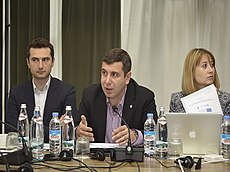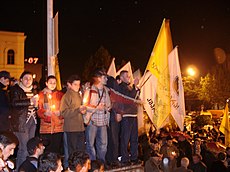Non-governmental organisations in Georgia (country)
(Redirected from Non-governmental organisations in Georgia)
Non-governmental organizations in Georgia, nongovernmental[1] organizations, or nongovernment organizations in Georgia,[2][3] commonly referred to as NGOs in Georgia,[4] are usually non-profit and sometimes international organizations[5] independent of governments and international governmental organizations (though often funded by governments)[6] that are active in humanitarian, educational, health care, public policy, social, human rights, environmental, and other areas to effect changes according to their objectives[7][8][9][10] and operate in Georgia.



List of NGOs in Georgia
edit| Name | Formation | Description | Official Website |
|---|---|---|---|
| Society for the Spreading of Literacy among Georgians | 1879 | The Society for the Spreading of Literacy among Georgians was the first non-governmental organisation in Georgia founded by Ilia Chavchavadze. The Society was a charity founded by a group of leading Georgian intellectuals in May 1879 in order to promote a cultural renaissance among the peasantry of Georgia, then part of the Russian Empire. It survived into the early Soviet period and operated until 1926/7. | |
| Liberty Institute | 1996 | Liberty Institute is a Georgian research and advocacy organization affiliated with Ilia Chavchavadze State University. Liberty Institute played an important role in the Rose Revolution. After the revolution, most of its founders were elected to the Parliament of Georgia. | [11] |
| New Economic School – Georgia | 2001 | The New Economic School – Georgia (NESG) (in Georgian: ახალი ეკონომიკური სკოლა საქართველო) is a free market think-tank, non-profit organisation, NGO based in Tbilisi, Georgia. Its main mission is education of young people in free market ideas. It organizes seminars, workshops and conferences for education and exchanges of ideas. | [12] |
| Institute for Development of Freedom of Information | 2009 | Institute for Development of Freedom of Information (IDFI) – is a Georgian non-governmental organization which tends to support the development of an informed and empowered society for democratic governance. IDFI promotes human rights and good governance by raising civic awareness through sound informational reports, research and recommendations; Advocates for initiating & implementing reforms of policies, laws and practices to enhance democratic governance. | [13] |
| Europe-Georgia Institute | June 1, 2015 | Europe-Georgia Institute (EGI) – is a hybrid non-governmental organization in Georgia. The Europe-Georgia Institute was founded by George Melashvili, Shalva Chkheidze and Revaz Topuria in 2015. The EGI states its goal is to inspire, empower, and connect people to change their world. The EGI is an independent civil society organization and focuses its campaigning on issues such as human rights, peacebuilding, promotion of good governance and support the involvement of youth in democratic process. The EGI emphasizes "independence and impartiality", and explicitly precludes political, economic, or religious factors in its decision making. EGI's principles and operational guidelines are highlighted in its Charter. | [14] |
| Caritas Georgia | November 4, 1994 | Caritas Georgia – is a non-governmental organization in Georgia. Caritas Georgia states that it is actively working in the fields of emergency response, humanitarian, social, health, and development. Caritas Georgia has been serving the indigent population of Georgia since its establishment. It has been working on creating such a Georgian society that protects each individual's dignity and fundamental rights. Peace, justice, mercy, and solidarity are established, and public interests prevail over individual interests. Based on the preceding, Caritas Georgia aims to promote human development and social justice, bring relief to vulnerable and disadvantaged people, and encourage self-responsibility and dignity. | [15] |
See also
editReferences
edit- ^ US dictionaries record only the unhyphenated spelling, and this is also recorded by some UK dictionaries, e.g. Collins English Dictionary
- ^ Claiborne, N (2004). "Presence of social workers in nongovernment organizations". Soc Work. 49 (2): 207–218. doi:10.1093/sw/49.2.207. PMID 15124961.
- ^ Ship Monitoring Rescues of Migrants Refuses to Be Rescued, The New York Times
- ^ The term NGO is so common and its expansion so rare that all dictionaries have an entry for the abbreviation but many don't have one for the expansion, or they even explain it by using the abbreviation, e.g. Collins English Dictionary
- ^ Because many of the most famous NGOs are international organizations, many people believe NGOs are by definition international, but that is not the way the term is used by NGOs, the media, governments, or international governmental organizations. (See the sources at the end of this sentence.)
- ^ "NGO", Macmillan Dictionary
- ^ "Nongovernmental Organization (NGO)". United States Institute of Peace.
- ^ Karns, Margaret P. "Nongovernmental organization". Encyclopaedia Britannica.
- ^ "NGO - meaning in the Cambridge English Dictionary". dictionary.cambridge.org.
- ^ "NGO". Lexico UK English Dictionary. Oxford University Press. Archived from the original on March 5, 2020.
- ^ "Liberty Institute". Retrieved August 16, 2018.
- ^ "IDEA". New Economic School – Georgia. Retrieved August 16, 2018.
- ^ "Official website of chair of the IDFI".
- ^ "Official website of Europe-Georgia Institute".
- ^ "Official website of Europe-Georgia Institute".